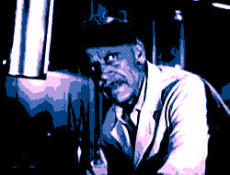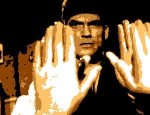Film Review
With some money still left in the kitty after he had completed shooting
Beyond the Time Barrier in a
matter of days director Edgar Ulmer was able to knock out another
super-economy sci-fi offering, although this time round inspiration
seemed to be in even shorter supply than the ready cash.
The Amazing Transparent Man is a
poor man's version of H.G. Wells'
The
Invisible Man, a film that invites us to ponder the morality of
science whilst vomiting a third rate caper plot into our unsuspecting
lap, along with dialogue that has you wondering why human beings ever
bothered inventing language. Whereas in previous years Ulmer's
creativity (nurtured in German expressionism) appears to have been
stimulated by the lack of resources, here it looks as if it has given
up the will to live, as might anyone who attempts to watch the
film. The moody beginning, which carries the unmistakable
doom-laden feel of the director's earlier films noirs, wrong-foots us
into expecting another Ulmer tour de force. Ten minutes in, the
film has found its level, a level occupied only by ragged genre
B-movies trying but failing to make a positive impact.
The Amazing Transparent Man
isn't quite as dismal as its tacky comicbook title suggests, and there
are a few things the film has in its favour. The script may be
terrible (probably the worst that Ulmer had to cope with) but the
principal cast make the most of what they are given and the
performances are good enough to hold the spectator's attention and
distract us (mostly) from the dreadful production values. The
special effects are modest, even for the standards of the time, but
they serve the story effectively, the gradual fading away and
reappearing of Douglas Kennedy (playing a character humorously but
incredibly named Faust) are well rendered, given the practically
non-existent budget. The film's main failings lie in the script,
which offers not only an almost total absence of plot but a crowd of
unconvincing stock characters that would struggle to get their
cumulative IQ into double figures. The ham-fisted attempt to make
some kind of moral point at the film's close is the final insult, and
if you were watching the film on DVD the likelihood is that five
seconds later the DVD will be doing a fair impression of a Frisbee
straight into the nearest litter gathering receptacle.
© James Travers 2015
The above content is owned by frenchfilms.org and must not be copied.
Film Synopsis
No sooner has Joey Faust broken out of jail than he finds himself a
prisoner of Paul Krenner, a former major in the U.S. army who plans to
create an army of invisible soldiers. Dr Peter Ulof, another
prisoner, has invented a machine that can render a man invisible, but
he needs additional equipment to make the process reliable, and this
equipment is presently only available in a secure government
installation. Offered a substantial bribe, Faust plays along with
Krenner and is made invisible so that he can steal the equipment Ulof
needs. Once he is invisible, Krenner realises he can pull off a
bank robbery without getting caught, but when he attempts this the
failings of Ulof's invisibility process becomes apparent...
© James Travers
The above content is owned by frenchfilms.org and must not be copied.



